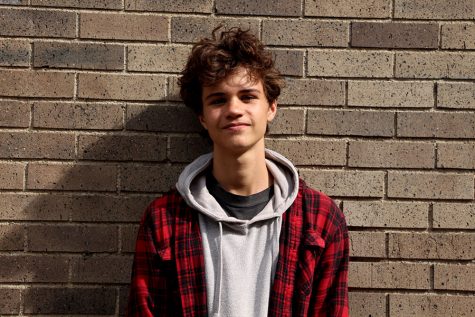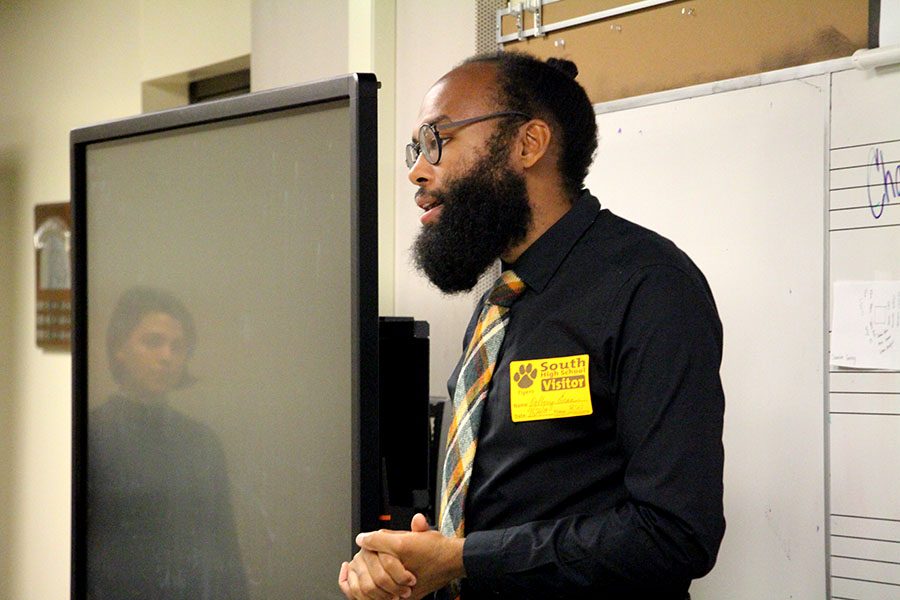“Trying to build bridges,” cultural curiosity connects the South Music Program
Anthony Green, a Freelance photojournalist and Associate Arts Director for Castle of Our Skin leads his first session with students in the Music Program. “Born out of the desire to foster cultural curiosity, Castle of our Skins is a concert and educational series dedicated to celebrating Black artistry through music,” reads the mission statement of Castle of Our Skins’ website. Photo: Henry Holcomb
The South Music Program was joined on September 26th for the first of six sessions to compose a musical piece. Led by Anthony R. Green, through the American Composers Forum, students will have the opportunity to learn about Black composers and write and perform their own piece.
Anthony Green is a co-founder of the organization, Castle of Our Skins. According to the organization’s website, http://www.castleskins.org/, it is “Born out of the desire to foster cultural curiosity, Castle of our Skins is a concert and educational series dedicated to celebrating Black artistry through music. From classrooms to concert halls, Castle of our Skins invites exploration into Black heritage and culture, spotlighting both unsung and celebrated figures of past and present.”
Through the McKnight Foundation and the American Composers Forum, which operates in the metro area and New York, Green came from his home in the Netherlands to South. He highlighted his personal passion for his work, “In my education…there was very very little study of Black composers. In 2013, me and my friend formed Castle of Our Skins, we realized that between the two of us we could name maybe five or six Black composers. We wanted to put together a concert of music by Black composers.”
“With Castle of Our Skins I have gone across the country teaching random people in universities, in high schools, in middle school; children, adults; about Black composers,” Green said.
Through his career, Green has worked to produce pieces about different aspects of social justice. Covering a wide array of topics Green has created work from discussions of race, to a soap opera about the experiences of a transgender woman, to a piece asking the audience to reflect on their privilege of American citizenship.
“Lots of times we see the news on TV and we don’t stop and think of the human form of empathy in these situations. There’s always initial reaction and politicians saying ‘thoughts and prayers, thoughts and prayers,’” said Green. “Where is the empathy? Where is the humanity? And so a part of my work with that piece and with other pieces is to make people more aware.”
“I grew up Black in the United States and experienced lots of situations that some of my friends who aren’t Black never experienced.” Green added that, “these situations you keep bottled… but when you grow up… and you get to name it some people want to do something about it and that feeling definitely came within me. When I made the choice to really embrace composing music that has a cultural justice element, it was really out of my strong desire to bring some justice to the world.”
Hoping to bring his extensive repertoire and passion for social justice to South, Green molded students’ perceptions of their instruments. Junior Haley Carlson spoke of her experience with the first session, “[Green] was telling us how to play our instruments in a different way than we would usually play them… [making] unexpected noises from not actually playing your instrument how you would usually play it,” said Carlson. “It was really interesting… making us think outside the box…soon we are going to compose a piece with him along those lines. About looking outside the box with how you play your instrument.”
Carlson, a student in Wind Ensemble which is a higher level of band, has hopes for the piece they plan on performing, “I really want it to be something that none of us have ever really experienced. And I have a feeling it will be because he’s really different from any musical person I have ever met.”
Green hopes students will learn this: “One of the elements of the mission of Castle of Our Skins is cultural curiosity and I think this is the most important element to take away. Being open, being curious about other people’s cultures, being aware of how other people do things and conduct their lives and not being afraid of how other people behave, act…trying to build bridges rather than building walls.”

Henry Holcomb is a senior at South and is the Features Editor for the Southerner. In his third year on the Southerner, Holcomb is excited to be involved...

